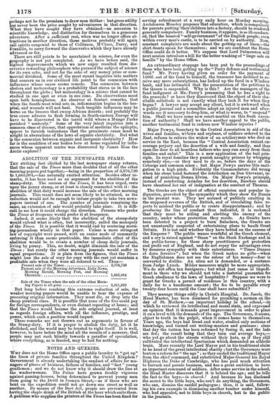ABOLITION OF THE .NEWSPAPER STAMP.
TICE striking fact elicited by the last newspaper stamp returns, that the sale of the Times more than doubles that of all the other morning papers put together,—being in the proportion of 3,976,720 to 1,665,094,—has naturally excited attention. Besides other re- marks, it has been used as an argument for the abolition of the atamp-daty. The success of the Times, it has been urged, rests upon the penny stamp, or at least is closely connected with it : the abolition of that duty would increase the sale of the other morning journals. This result does not seem likely to be attained, as the reduction would not be enough to induce people to take two news- papers instead of one. The number of journals remaining the same, an extension of sale would probably take place. It is diffi- cult to see how it could change the direction. Persons who prefer the Times at fivepence would prefer it at fourpenee.
Indeed, it seems likely that the abolition of the stamp-duty would extend what is often, but incorrectly, called the monopoly of the Times. It is possible that it would end. by centering morn- ing-journalism wholly in that paper. Unless a more stringent law of copyright were passed, with an easier mode of summarily enforcing it than seems practicable, the immediate effect of the abolition would be to create a number of cheap daily journals, living by piracy. This, no doubt, might diminish the sale of the /Ines but surely the other morning journals would suffer in equal proportions. It is plain from the figures, that the Times nught lose the sale of copy for copy with the rest yet maintain a profitable sale when they were all reduced to nil, Thus- . Present sale of the Times. 3,976,720 Present sale of the Morning Advertiser, Daily News, Morning Herald, Morning Post, and Morning
Chronicle. 1,665,094 Bale of the Times when the sale of the other Morn- - ing Papers is all gone 2,311,626
'But long before reselling this extreme reduction of sale, the weaker morning papers would be unable to bear the expense of procuring original information. They must die, or drop into the cheap piratical class. It is possible that none of the five could pay for foreign correspondents, or even distant reporting at home ; and that the Times would become the sole original journal, at least as regards foreign affairs with all the influence, prestige, and power, which such a position would impart.
- These remarks are not thrown out as arguments in favour of the Stamp-duty. If it is proper to abolish the duty, let it be abolished, and the world may be trusted to right itself. It is well, however, to have before the mind all the results of a measure, that people may not rush blindly towards a paradise of speculation, where everything, as is fancied, may be had for nothing.


























 Previous page
Previous page